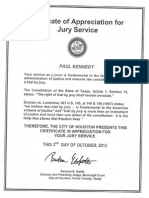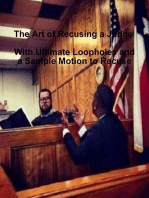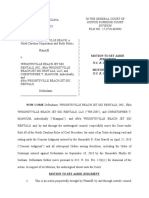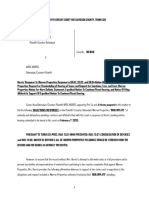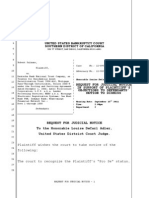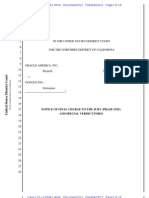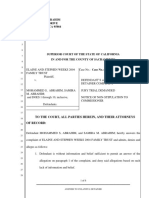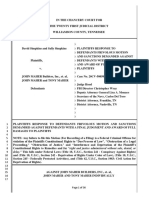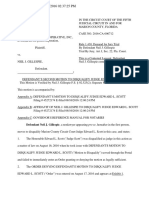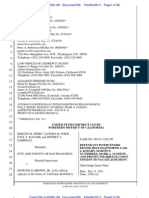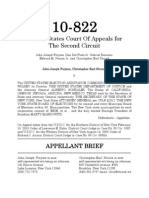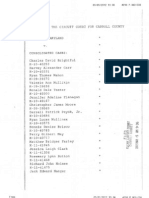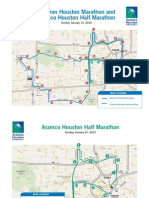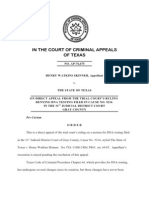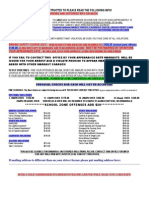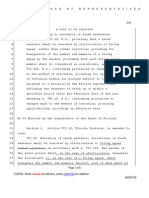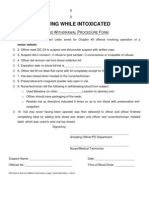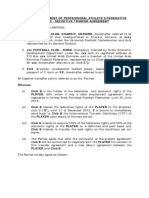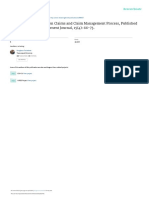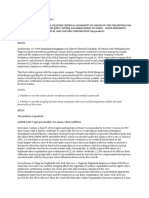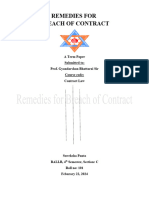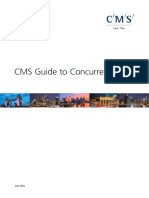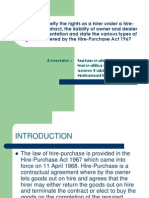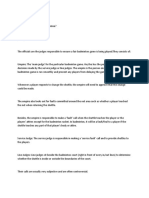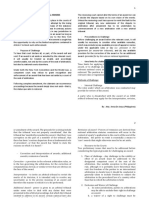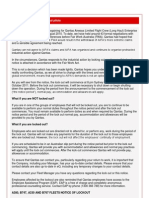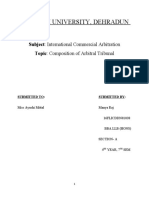Bennett Motion For New Trial
Bennett Motion For New Trial
Uploaded by
Paul B. KennedyCopyright:
Available Formats
Bennett Motion For New Trial
Bennett Motion For New Trial
Uploaded by
Paul B. KennedyOriginal Description:
Original Title
Copyright
Available Formats
Share this document
Did you find this document useful?
Is this content inappropriate?
Copyright:
Available Formats
Bennett Motion For New Trial
Bennett Motion For New Trial
Uploaded by
Paul B. KennedyCopyright:
Available Formats
CAUSE NO.
2013-56866
COMMISSIONER FOR IN THE DISTRICT COURT OF
LAWYER DISCIPLINE,
Commission,
v. HARRIS COUNTY, TEXAS
BOB BENNETT a/k/a
ROBERT S. BENNETT,
Defendant. 334
th
JUDICIAL DISTRICT
DEFENDANT'S MOTION FOR NEW TRIAL
Defendant Robert S. Bennett (Bennett), individually (hereinafter Defendant)
and files this Motion for New Trial, pursuant to Rules 324 and 329b of the Texas Rules
of Civil Procedure. The fee required for filing this motion for new trial is being tendered
along with the motion by separate letter. In support of its motion, Defendant shows this
Court as follows.
INTRODUCTION
On February 5, 2014, The Commission for Lawyer Discipline (Commission), a
Committee of the State Bar of Texas filed its amended first disciplinary petition against
attorney Robert S. Bennett (Defendant). Commissions Amended Petition alleges that
Defendant engaged in conduct in violation of Rules 1.15(d) and 3.02 of the Texas
Disciplinary Rules of Professional Conduct. A bench trial was conducted where
Defendant was the only party that introduced any testimonial evidence. At the end of this
trial, this Court, on March 21, 2014, entered a final judgment that Defendant violated two
4/22/2014 4:26:19 PM
Chris Daniel - District Clerk Harris County
Envelope No. 1058671
By: Deandra Mosley
disciplinary rules and should be disbarred from the practice of law. A new trial should be
granted because the evidence is factually and legally insufficient to support the trial
courts judgment and the trial court abused its discretion in finding disbarment was an
appropriate sanction. No rule was violated, and that aside, no evidence supports such a
severe sanction.
This court found that Defendant should be disbarred solely on the fact that
Defendant pursued an appeal from an arbitration award granted against him in a dispute
between himself and a former client. This court somehow found it unfair that that the
former client did not get his money right away but rather Defendant (as is his right to do
so) took an appeal from the award. Defendant did not engage in any sanctionable conduct
nor did he violate any rule.
It was the Commissions burden to prove its case by a preponderance of the
evidence. It failed this burden completely. During the trial, the Commission did not put
on a single factual or expert witness to support its case against Defendant, nor did the
Commission put forth any evidence to support disbarment. To the contrary, Defendant
put on several factual and expert witnesses and has copious amounts of evidence to
support his position that disbarment was completely unjustified. Moreover, the
Commission did not even seek a sanction of disbarment in this case (the Commission
actually asked for a probated sentence)this court improperly found disbarment on its
own. The court stated that it had never previously tried a disbarment case.
In sum, no rule was violated in this case and the Court of Appeals itself held that
the appeal was not frivolous but reasonable. This court failed to appropriately weigh and
2
consider the factors under Texas Rules of Disciplinary Procedure Rule 3.10 and abused
its discretion by failing to consider any lesser sanctions (not that any were warranted)
when finding that disbarment was an appropriate sanction. A true and correct copy of
the Courts final judgment is attached hereto as Exhibit A.
Defendant is also filing a motion for judgment notwithstanding the verdict
(J NOV). By filing this motion for new trial, Defendant is in no way waiving any of the
points previously made in other motions or withdraws any other motion. By pleading
that there is factually insufficient evidence in support of the jury findings identified
herein, Defendant does not waive their arguments that there is no evidence in support of
such findings. By pleading in this motion that the jurys findings on certain matters were
contrary to the overwhelming weight and preponderance of the evidence, Defendant does
not waive his arguments that such findings were not established as a matter of law.
MOTION FOR NEW TRIAL
I. The evidence is factually and legally insufficient to support all of the trial
courts findings in its final judgment.
A. The courts finding No. 2 should be set aside, and a new trial granted, for the
following reasons:
1. The evidence is factually and legally insufficient to support the courts
finding in No. 2. There is insufficient evidence to support a finding that
Defendant committed professional misconduct as defined by Rule 1.06V of
the Texas Rules of Disciplinary Procedure or that Defendant violated one
or more of these Rules; Article X, Section 8, of the State Bar of Texas.
2. The overwhelming weight of the evidence shows otherwisethat no rule
was ever violated. (See Exh. B, letters in support of motion, including
letter of Lillian Hardwickan expert witness at trial and Anthony
Griffina lawyer who testified at the grievance hearing; and Peyman
3
Momeni and legal experts J udge Dan Naranjo and Don Karotkin)
1
All of
these same individuals testified at the trial and explained that no rule was
violated and Defendant never engaged in any professional misconduct or
unethical behavior.
3. The courts findings in No. 2 are contrary to the overwhelming weight of
the evidence.
1
Attached to this motion are 23 letters in support of the Motion. The Defendant recognizes that they are not
being submitted for evidentiary purposes but for altering the Court to the Testimony that was presented in the
absence of the Transcript which is in preparation. The Court is aware that the following individuals whose
letters are attached testified that there were no Rule violations and no basis for disbarment. They are as follows:
a. Attorney Lillian Hardwick ethics expert and co-author of Handbook of Texas Lawyer
and J udicial Ethics: J udicial Ethics Standards Recusal and Disqualification of J udges
(2014)
b. J udge Dan Naranjo ethics expert and former United States Magistrate, former President of
the San Antonio Bar Association, and member of Executive Committee of the State Bar of
Texas
c. Attorney Don Karotkin ethics expert and Board Certified in Personal Injury.
d. Attorney Anthony Griffin ethics expert and client of Defendant
e. Attorney Peyman Momeni former client of Defendant
f. Attorney J eff Wagnon Former client of Defendant and lead counsel for trial
g. Attorney J orge lopez testified for Defendant and affidavit is attached
h. Attorney Rachaelle Reynolds attended and observed the trial
i. German Law Student Hannes J amssen attended and observed the trial
j. Armenian Law Student Gayane Abraham Abrahamyan attended and observed the trial
k. Anthony Graves former client of Defendant and exoneree who was on death row for 16
years.
The following letters are from attorneys and others who have addressed the points of consideration under Rule 3.02:
a-1 Attorney Richard Schechter - Local Grievance Committee Chairman, Chairman of
Houston Community College
b-2 Attorney Stephen Estes Houston attorney
c-3 Attorney Charles Houssiere - Houston attorney
d-4 Attorney David Lee Houston attorney
e-5 Attorney Kirk Kennedy Houston/Dallas attorney
f-6 Attorney Barbara Radnosky Houston attorney
g-7 Mike Willborn Rule 3.10 evidence letter
h-8 J ohn Dossey Rule 3.10 evidence letter
i-9 Tommy Thompson Rule 3.10 evidence letter (to be substituted later).
j-10 Counselor David Lockett Rule 3.10 letter
k-11 Vince McCauley Rule 3.10 letter
l-12 Gary Cunningham Rule 3.10 letter
m-13 Ali Candir Executive Director of the Institute of Interfaith Dialogue
4
B. The courts finding No. 3 should be set aside, and a new trial granted, for the
following reasons:
1. The evidence is factually and legally insufficient to support the courts
finding that Defendant violated Texas Disciplinary Rule of
Professional Conduct 1.15(d) and 3.02. The overwhelming weight of
the evidence shows the complete oppositethat no rule was
violated. In addition, these rules do not apply to the circumstances in
which this court seeks to apply them.
2. These findings are contrary to the overwhelming weight of the evidence.
C. The courts finding No. 4 should be set aside, and a new trial granted, for the
following reasons:
1. The evidence is factually and legally insufficient to support this finding.
2. The court erred in denying all of Defendants affirmative defenses. The
court has no grounds for doing so.
3. The court erred in denying the Defendants expert testimony regarding the
rule violations. The Court has no grounds for disallowing this
testimony
D. The courts disbarment sanction should be set aside, and a new trial granted,
for the following reasons:
1. This courts finding is supported by legally and factually insufficient
evidence.
2. This court failed to consider the factors in Rule 3.10 as applied to the
evidence admitted at trial. The Commission failed to call a single
expert or factual witness to support its allegations against Defendant.
The Commission did not even call Defendants former or current
clients or the Complainant to testify against Defendant. The only
Commission evidence admitted at this trial were the pleadings of the
underlying arbitration which the court of appeals found was not a
frivolous appeal and did not warrant any sanction.
3. This court erred in failing to properly weigh or consider lesser sanctions, as
required and as requested by the Commissioner itself.
5
4. The trial court abused its discretion in imposing a sanction of disbarment.
Arguments in support of Motion for New Trial
Without waiving any of the points made above, Defendant provides this further
explanation for some points already made, in addition to further points.
Standards of Review
Factual sufficiency. In reviewing the factual sufficiency of the evidence, the
Court must consider, weigh, and examine all of the evidence in the record. Dow Chem.
Co. v. Francis, 46 S.W.3d 237, 241 (Tex. 2001). The Court must reverse and remand for
a new trial if there is factually insufficient evidence to support the finding of a vital fact
or the jurys finding is so against the great weight and preponderance of the evidence as
to be clearly wrong and unjust. Pool v. Ford Motor Co., 715 S.W.2d 629, 635
(Tex.1986).
Legal sufficiency. Challenges to the legal sufficiency of the evidence must be
sustained when the record discloses one of the following: (1) a complete absence of
evidence of a vital fact; (2) the court is barred by rules of law or evidence from giving
weight to the only evidence offered to prove a vital fact; (3) the evidence offered to prove
a vital fact is no more than a mere scintilla of evidence; or (4) the evidence established
conclusively the opposite of a vital fact. King Ranch, Inc. v. Chapman, 118 S.W.3d 742,
751 (Tex. 2003); The Kroger Co. v. Persley, 261 S.W.3d 316, 319 (Tex. App.Houston
[1st Dist.] 2008, no pet.).
Abuse of discretion. A contention that there has been an abuse of discretion
6
presents a question of law. Smith v. State, 490 S.W.2d 902, 912 (Tex. App.Corpus
Christi 1972, writ ref'd n.r.e.). The trial court must consider a wide range of sanctions for
violations of the disciplinary rules in comparison to the alleged misconduct committed or
rule violated. Daves v. State Bar of Texas, 691 S.W.2d 784, 791 (Tex. App.Amarillo
1985, writ ref'd n.r.e.). A judgment of a trial court in a disciplinary proceeding may be so
light, or so heavy, as to constitute an abuse of discretion. Id. (emphasis added). An
appellate court should reverse the trial courts decision if an abuse of discretion is shown.
Eureste v. Comm'n for Lawyer Discipline, 76 S.W.3d 184, 202 (Tex. App.Houston
[14th Dist.] 2002, no pet.). A trial court abuses its discretion only if it acts in an
unreasonable and arbitrary manner, or when it acts without reference to any guiding
principles. Id.
A. Rule 3.02 was not violated and does not apply in this case.
Commission alleged that the acts and/or omissions of Defendant constituted
conduct in violation of Rule 3.02 of the Texas Disciplinary Rules of Professional
Conduct (Minimizing the Burdens and Delays of Litigation). Rule 3.02 states:
In the course of litigation, a lawyer shall not take a position that
unreasonably increases the costs or other burdens of the case or that
unreasonably delays resolution of the matter.
This rule does not apply. It is designed to protect the clients adversary, not the
client from undue delay. Both this court and the Commissions lawyer stipulated that the
original contract between Defendant and Land was a sound contract and there was no
Rule Violation concerning the Contract. Indeed, Defendant required that Land have a
third party attorney read and approve the contract. According to the Commission, there
7
was nothing frivolous or unethical about the way Defendant handled Lands case from
the time the Contract was signed in February of 2011 up to the time the Order approving
the Arbitration entered in August of 2012. After that, the court of appeals found that
there was nothing frivolous about the appeal.
1. The rule does not apply here.
Rule 3.02 is a rule that is categorized under the attorneys role as an advocate.
Application of this rule to the facts of this case was improper because Defendant was
represented by counsel throughout the proceedings with the Complainant, and as such,
Defendant did not act as an advocate and therefore the Rules set forth in Section 3 of the
TDRPC do not apply. The first four rules [Rules 3.01, 3.02, 3.03 and 3.04] address
various aspects of a lawyers duty to advance a clients cause only within the bounds of
the law. Handbook of Texas Lawyer and Judicial Ethics (2010-2011 edition), 8, p. 13.
Rule 3.02 applies to the conduct of a lawyer while representing a client and is
designed and intended to protect the clients adversary, not the client, from undue or
unreasonable delay, burden or expense. Nothing in the rule or the following comments
suggest that this Rule is in any way intended to govern a litigated dispute between a
lawyer and a former client. The comments to the rule make it clear that it is the clients
adversary who is sought to be protected under Rule 3.02. See TDRPC 3.02, comment 1
(because such tactics are frequently an appropriate way of achieving the legitimate
interests of the client that are at stake in the litigation, only those instances that are
unreasonable are prohibited).
8
Here, Defendant was represented throughout the various stages of this proceeding.
He was not acting as an advocate of any third partys interests at any stage of the
proceedings, and therefore Rule 3.02 is not applicable to these facts. In addition, the
notes to Rule 3.02 expressly state that a lawyers obligations under Rule 3.02 are
substantially fulfilled by complying with Rules 3.01, 3.03 and 3.04. See TDRPC 3.02,
comment 2. There is absolutely no allegation that these rules were even violated, and
there would be no evidence to support such allegations.
Based on the existing case law related to the jurisdiction of arbitration panels in
the context of alleged incapacity of a party
2
, and the express mandate of the Court of
Appeals that the appeal was not frivolous, any determination under Rule 3.01 is
conclusively in Defendants favor.
2. The Court of Appeals opinion demonstrates that nothing about
Defendants actions were frivolous or sanctionable.
The Court of Appeals, after considering the record, briefs and other documents
filed with the Court of Appeals, the Court stated that; an appeal is frivolous when the
record, viewed from the perspective of the advocate does not provide reasonable grounds
for the advocate to believe that the case would be reversed. See 01-12-00795-CV, 1
st
Court of Appeals, Memorandum Opinion dated J une 4, 2013, at p. 17, citing Smith v.
Brown, 51 S.W.3d 376, 381 (Tex. App Houston [1
st
Dist.] 2001, pet. denied).
The Court of Appeals noted that it has discretion to award a prevailing party
damages if the Court objectively determines that an appeal is frivolous and that the
2
In Re Morgan Stanley & Co., Inc., No. 07-0665 (Tex. 2009)
9
decision to grant appellate sanctions is a matter of discretion that an appellate court
exercises with prudence and caution and only after careful deliberation. Id. The Court
refused to impose Lands request for Rule 45 sanctions and stated that it will do so only
in in circumstances that are truly egregious.
Lastly and most importantly, the Court of Appeals held that while the Court
disagrees with the merits of the appeal, the appeal is not frivolous and the circumstances
do not warrant sanction. Thus, there was no violation of Rule 3.02, Defendants appeal
of the arbitration award was not frivolous and Defendant pursued litigation that he
believed was meritorious. There was no contrary evidence offered that the appeal was not
reasonable.
B. Rule 1.15(d) was not violated and does not apply here.
Rule 1.15(d) states:
(d) Upon termination of representation, a lawyer shall take steps to the
extent reasonably practicable to protect a client's interests, such as giving
reasonable notice to the client, allowing time for employment of other
counsel, surrendering papers and property to which the client is entitled and
refunding any advance payments of fee that has not been earned. The
lawyer may retain papers relating to the client to the extent permitted by
other law only if such retention will not prejudice the client in the subject
matter of the representation.
1. The rule does not apply herethere was no withholding of property.
Contrary to the allegations of Commission and Land that Defendant impermissibly
withheld property Land is entitled to and failed to return advance payments of fee that
has not been earned, not only has Defendant returned all items that were given to him by
Land, this was not even a matter presented prior to the grievance. In addition, on J anuary
10
22, 2013, post appeal, Defendant posted a cash bond in lieu of supersedeas bond in the
amount of $30,931.11 in the court registry of Harris County District Court, which
covered the original $27,500 arbitration award, plus the court costs and attorneys fees
incurred by Land to date, plus interest accrued from the date of judgment to posting the
cash bond.
The provisions of Rule 1.15(d) apply primarily to the return of property, files and
unearned fees at the time of termination. At the time Defendant was terminated, all
funds held in retainer were billed, and additional fees in in excess of $25,000 were owed.
At all times, Defendant complied with the contractual provisions relating to billing by
billing on a monthly basis at the address registered on the contract. The contract between
the parties provided a mechanism and construct for Land to dispute the billing, and Land
agreed to do so within 30 days of receipt of the billing, otherwise the bills would be
deemed final. (See contract, X. Miscellaneous Provisions, s N & Oon file with this
Court) Land never disputed any of the charges until well after the 30 day dispute period
had elapsed, and the retained had been exhausted.
The duty to promptly deliver to a client on termination of the representation any
funds or other property that the client is entitled to receive is not triggered where, as here,
there is a good-faith controversy between the lawyer and client regarding whether or not
the client is entitled to receive the funds or property in question. Otherwise, Rule 1.15(d)
would require a lawyer to give the client any and all funds the client requested, whether
rightly or wrongly. Such an interpretation of the rule is patently unreasonable and unfair.
11
Where, as here, Land paid Defendant a retainer, which was placed in Defendants
trust account, and billed monthly as required by the contract, and no timely dispute of the
monthly bills was made, then Defendant at that point was permitted to deem those fees
earned and transfer those funds from his trust account to his operating account. See
Handbook of Texas Lawyer and Judicial Ethics (2010-2011 edition), 6:15, page 930,
citing Cluck v. Commission for Lawyer Discipline, 214 S.W.3d 736, 740 (Tex. App.
Austin 2007, no pet.).
2. Rule 1.15(d) was not violatedno funds or property were improperly
held by Defendant.
There is no professional misconduct claimed for not returning funds prior to the
arbitration award. There is no claim for professional misconduct for the time period that
the district court case to affirm the arbitration award was pending. Rather, the
Commission claimed that the mere failure to pay the arbitration awarded funds after the
district court confirmed the arbitration award is professional misconduct. That certainly
does not comport with the entire concept of jurisprudence and the United States Court
system. Parties are granted the opportunity to appeal adverse rulings all the way to the
Supreme Court. Indeed, the Court of Appeals itself found that that the proceeding was not
sanctionable or frivolous.
In addition, Defendant also paid a cash bond into the state court registry in the
amount of the arbitration award, plus accrued court costs, fees and interest. Defendant
acted appropriately in placing the disputed funds into the court registry.
12
In sum, there was no violation of Rule 1.15 (d) and Defendant did not
impermissibly withhold any documents or other property to which Land is entitled. The
allegations presented to the Office of Chief Disciplinary Counsel do not rise to the level
of professional misconduct unless every fee dispute between an attorney and his client
could be subject to a grievance.
The Commissions Counsel stated to the Court that the Defendant did not violate
any Professional Conduct Rule at the time of termination in J une of 2011. This safe
harbor ( no Rule Violations ) continued up to the time the District Court entered its final
order August 2012. When the Land claim was not paid back, and the appeal was
noticed, that act caused a relation back to the original Termination and the Rule 1.15
(d) violation occurred. No factual or expert or law or case was offered to substantiate
counsels interpretation of the facts.
C. This court erred in excluding expert testimony.
Defendant tried to provide expert testimony that would aid the court in
understanding the evidence and the intent of the rules. He offered Lillian Hardwick, Dan
Naranjo, Don Karotkin and Anthony Griffin as expert witnesses. The Commission
objected citing TRE 702, and saying that the use of expert testimony was not necessary in
bench trials.
This court agreed, and the judge stated: she didnt need anyone telling me what to
think. An offer of proof was made, and the court stood on its ruling. The court did
permit the expert testimony to be entered into the record as a bill of exception, in the
judges absence. Despite claiming not to need expert testimony, this court stated on the
13
record on several occasions that it was unfamiliar with the rules and the procedures being
used in the disciplinary trial. Expert testimony by someone with the specialized
knowledge of the disciplinary rules and procedures could have been an aid to help the
judge navigate the rules, and the comments thereto, and even explain the intent of the
parties who drafted and crafted the rules and procedures. It was error to exclude such
expert testimony in this case.
The Petitioner mislead the court about the use of experts when it said that experts
might have been appropriate to determine competency. However, the use of experts is
common in disciplinary matters, and experts have been used for far more than
determination of competency. See e.g. Belt v. Commission for Lawyer Discipline, 970
S.W.2d 571 (Tex. App.Dallas 1997, no pet.)(expert disallowed because of failure to
timely designate); Commission for Lawyer Discipline v. C.R., 54 S.W.3d 506 (Tex.
App.Fort Worth 2001, pet. denied)(Expert testimony on advertising rules and
applicability to disciplinary rules); Izen v. Commission for Lawyer Discipline, 2009 WL
5148144 (Tex. App.Houston [1st Dist.] 2009, no pet.)(expert testimony allowed to
analyze advertisements and identify violations of the disciplinary rules); Kennedy v. State
Bar of Texas, 1995 WL 613072 (Tex. App. Houston [14th Dist.] 1995, no pet.)(expert
testimony offered by State Bar as to ethical standard of care for lawyers, and opinion of
respondents lack of competency and trustworthiness); Kershner v. State Bar of Texas,
879 S.W.2d 343 (Tex. App.Houston [14th Dist.] 1994, writ den.)(State Bar expert on
excessiveness of fee); State Bar of Texas v. Kilpatrick, 874 S.W.2d 656 (Tex. 1994)(State
Bar expert witness testified on barratry); McIntyre v. Commission for Lawyer Discipline,
14
169 S.W.3d 803 (Tex. App. Dallas 2005, pet. denied)(Respondent experts testified
about the ethical obligations of lawyers to their client); Turton v. State Bar of Texas, 775
S.W.2d 712 (Tex. App. San Antonio 1989, writ denied)(Respondent expert witness
allowed to give opinion about the propriety for compulsory suspension related to whether
certain crimes were crimes of moral turpitude per se).
There is no dispute that the experts tendered by Bennett were qualified to testify as
experts relating to the professional disciplinary rules. Hardwick is a leading author on the
subject in the State of Texas, being a co-author of the treatise Handbook of Texas
Lawyer and J udicial Ethics. Hardwick also has served on the State Bar of Texas
Disciplinary Rules of Professional Conduct committee for a number of years, including
sole chair for three years. She also worked hand in hand with the Texas Supreme Court
with the redrafting of the new rules proposed in the 2011 Referendum. Even the counsel
for the Petitioner stated without equivocation that there is no question that Hardwick was
an expert in her field. It would be difficult for the Commission to dispute her
qualifications as an expert since the Commission has used her as a consulting expert in
the past. Hardwicks testimony was in the nature of summary judgment testimony, in
that her testimony was that even if the facts as alleged by the Commission were true, and
even if the facts as determined by the court were true, that the facts as presented and
proven do not implicate the rules claimed to have been violated by the Commission.
Dan Naranjo is a former U.S. Magistrate J udge in the Western District of Texas, a
former member of the Commission for Lawyer Discipline for eight years, and a member
of the Executive Committee of the State Bar of Texas. Naranjo was present and available
15
to present a unique perspective to aid the judge in eliminating any confusion or
unfamiliarity with the rules. By having previously served on the Commission for Lawyer
Discipline, Naranjo could have offered the court the perspective of the ultimate client of
the Chief Disciplinary counsels office, whose interests were represented by Bersch.
Naranjo testified that based on the facts presented, he did not see a rule violation, and
certainly not the rules as alleged. The court could have received Naranjos perspective of
the client directing Berschs actions to help understand the issues before the court and be
fully informed of the rules and procedures in a disciplinary trial.
Don Karotkin also offered a unique perspective to this case that could have aided
the court in understanding the rules and procedures before the court. Karotkin is a 40
plus year lawyer in the Houston area, whose sub-specialty is defending lawyers in the
disciplinary process. Most importantly however, is that Karotkin formerly served on the
District Grievance Committee, serving a year and a panel chair. His perspective would
have been beneficial to the court because in his capacity as a grievance committee
member, Karotkin actually served as a trier of fact in disciplinary cases, and his
experience and familiarity with the rules and procedures would have been beneficial to
the court to clarify any confusion the court had with the rules and procedures.
Anthony Griffin was available and ready to share a most unique perspective to
assist the judge. Griffin has a history of bar discipline over his many years of practice,
including a series of grievances filed against him as a result of a personal vendetta by
former U.S. District J udge Sam Kent. The judge listened with incredulity as Griffin
related the factual basis of some 18 grievances filed against him as a result of comments
16
made in orders issued by Kent, and went so far as to challenge Griffin on the truth and
validity of his statements. Kent was removed from his lifetime appointment as a District
J udge and convicted of criminal activity. Griffin was able to get those 18 grievances
dismissed against him. Griffins perspective as an accused attorney and how the rules
and procedures were applicable in his case and the instant case could have been helpful to
eliminate any confusion the judge had with respect to the rules and procedures in the
disciplinary case.
It is lamentable that the court was not exposed to the four different and relevant
perspectives that were available to aid the court in clarifying the rules and procedures
used in disciplinary trials, which the court repeated stated on the record that she was
unfamiliar with. While the exclusion of these witnesses at trial worked to the Petitioners
advantage, the repeated expression of unfamiliarity and confusion by the court about the
rules and procedures will likely result in this case being remanded back to the court for
trial, which could have easily been prevented by the appropriate use of experts at trial.
In addition, legal malpractice claims are similar in nature to professional
misconduct claims. Both involve rules and standards, the breach of which can be the
basis of liability for a lawyer. It is well settled that expert testimony is required in legal
malpractice cases, even in bench trials. Alexandar v. Turtur & Assocs., Inc., 146 S.W.3d
113, 115 (Tex. 2004); Abdelhak v. Farney, No. 04-07-00121-CV (Tex.App.San
Antonio 2007, no pet.) (concluding that not requiring expert testimony in legal
malpractice cases tried to the bench would require a subjective determination of the
17
particular trier of facts knowledge, and declined to modify the expert testimony
requirement in the case of bench trials).
In this case, it was important for the court to have some basis for understanding
the rules, procedures and the link between a lawyers conduct and harm to a client. It was
also important for the judge to understand what the intent was behind the drafting of the
rules, and an expert was available on the spot to render such aid to the court. Expert
testimony would have been very beneficial in this case and should have been admitted. It
was harmful error to exclude such testimony.
D. This court abused its discretion because its order of disbarment is excessive
and not warranted under the circumstances.
The only testimonial evidence presented during this trial was that from the
Defendant. The Commission failed to put forth any expert or factual testimonial evidence
in support of its allegations or to support this courts finding of disbarment. In fact, the
Commission never even requested disbarment in this case. It also was rather odd that the
Commission refused to even cross examine the numerous factual and expert witnesses the
Defendant offered. Even the Defendant was never cross examined.
1. This court did not properly consider and weigh the 3.10 factors in face
of the actual evidence presented at the trial.
The guiding principles a trial court is required to consider when deciding
sanctions for an attorneys misconduct are set forth in Disciplinary Rule 3.10. Pursuant to
Rule 3.10, a court shall consider: (A.) the nature and degree of the Professional
Misconduct for which Respondent is being sanctioned, (B.) the seriousness of and
circumstances surrounding the Professional Misconduct, (C.) the loss or damage to
18
clients, (D.) the damage to the profession, (E.) the assurance that those who seek legal
services in the future will be insulated from the type of Professional Misconduct found,
(F.) the profit to the attorney, (G.) the avoidance of repetition, (H.) the deterrent effect on
others, (I.) the maintenance of respect for the legal profession, (J .) the conduct of the
Respondent during the course of the Committee action, (K.) the trial of the case, and (L.)
other relevant evidence concerning the Respondent's personal and professional
background. TEX. RULES DISCIPLINARY P.R. 3.10, reprinted in TEX. GOV'T CODE ANN.,
tit. 2, subtit. G, app. A1.
In its final judgment, the trial court stated [t]he Court, after considering all of the
factors listed in Rule 3.10 of the Texas Rules of Disciplinary Procedure, finds that the
proper discipline of the Respondent for each occurrence of professional misconduct is
disbarment. This court did not and could not have considered all of these factors
because the Commission did not present any evidence on these factors at the sanction
hearing. No factual or expert testimonial evidence was offered. No new documentary
evidence was offered.
On the other hand, Defendant offered numerous witnesses who addressed all 12
factors in a very favorable light to the Defendant. See attached letters a to k of witnesses
who appeared or were present at the trial. It is apparent that this evidence and testimony
was not even considered by the court. If the court had actually considered these factors
and weighed them appropriately from the evidence offered by the Defendant, this court
would not have reached a finding as egregious as disbarment under the facts of this case.
19
Defendant introduced the following witnesses on his behalf at the trial in support of the
above factors:
1. Lillian Hardwick. She is the leading lawyer and author of ethics in
Texas and has co-authored a three volume work entitled: Handbook
of Texas Lawyer and J udicial Ethics. A portion of Ms. Hardwicks
testimony was improperly excluded because this court stated it was
too much information. Ms. Hardwick did however testify under Rule
3.10 about the Defendants reputation and standing in the
community. (see attached letter B( a)). Further, her letter
demonstrates why the Defendant did not violate the two Rules under
consideration
2. Dan Naranjo. He is a former United States Magistrate and former
President of the San Antonio Bar Association. He also served on the
Commission for Lawyer Discipline for 6 years and is the present
head of the Board of Directors of the Executive Committee of the
State Bar of Texas. This court improperly excluded Mr. Naranjos
opinions on Defendants reputation or rule violations but was able to
testify during the sanction phase and how the 12 considerations
under 3.10 were favorable to the Defendant. (see attached letter B-
(b)). Legal experts Hardwick and Naranjo were in complete
agreement that the Defendant did not violate any Disciplinary Rules
or there were any considerations under R. 3.10 justifying any
sanction.
3. Don Karotkin. He is board certified in PI and has defended
numerous grievance matters in his 40 year career. He is familiar with
the Defendants reputation. He was not allowed to testify about rule
violations but gave testimony about Defendants impeccable
reputation and character. (see attached letter B-(c)). Karotkin was
very clear as to his opinions about how the court abused its
discretion by imposing the death penalty of disbarment. He states in
his attached letter: In my forty years of active trial practice,
including over 100 jury trials and a number of bench trials, I have
never been more shocked or dismayed than I was by this result.
Additionally, his opinions reflected what Hardwick and Naranjo
have stated:
In my opinion, Rule 1.15(d) does not apply here. The
duty to promptly deliver to the client on termination of
the representation any funds or other property that the
20
client is entitled to receive is not triggered where, as
here, there is a good-faith controversy between lawyer
and client regarding whether or not the client is
entitled to receive the funds or property in question.
Otherwise, this rule would require a lawyer to give the
client any and all funds the client requested, whether
rightly or wrongly. Such a construction of the rule is
patently unreasonable and unfair. I agree with your
other expert that Rule 3.02 does not apply here. That
rule applies to the conduct of a lawyer while
representing a client and is designed and intended to
protect the client's adversary, not the client, from
undue or unreasonable delay, burden and expense.
There is nothing in the rule or the comments following
it that suggest that the rule applies to litigation between
lawyer and former client. In fact, the comments,
particularly comment 1, make it very clear that it is the
lawyer's client's adversary whois sought to be
protected.
4. Anthony Griffin. He is the leading civil rights attorney in Galveston,
and maybe in the State. This court improperly excluded his
testimony on rule violations but he gave testimony on Rule 3.10
factors. (see attached letter (B-d)). He testified as both an attorney
and the Defendants client. He notes that the Defendant has never
been reprimanded by the Bar, took steps to protect the Complainant
on appeal, and exercised his Constitutional Right to appeal.
5. Peyman Momeni. He is a local attorney who was the subject of a
complaint and interim suspension and Defendants client at one
point. The interim suspension was defeated, the complaint
dismissed, the state prosecutor fired and the state investigator
indicted. The court improperly excluded his testimony regarding
Defendants character and Rule 3.10 factors. (see attached letter B-
(e). Momeni notes the abuse of discretion and lack of any evidence
of a Rule violation.
6. J orge Lopez. He is a local young attorney who works for the local
foundation that provides indigent legal services. He was one of the
co-counsels in Defendants original suit that was arbitrated. He was
21
present as co-counsel during this arbitration and testified that the
entire procedure was ethical and not frivolous. His affidavit his
attached as Exhibit B-(f)).
7. J eff Wagnon. Wagnon was lead counsel for the Defendant and was
in complete agreement with the other legal experts that no rule
violation occurred and that the disbarment was not justified. (see
attached letter (B-g)). He also was aware of how strange some of the
courts rulings were and how unfair they appeared.
Lillian Hardwick, Dan Naranjo, Don Karotkin, Anthony Griffin, Peyman Momeni,
J eff Wagnon and J orge Lopez all testified that Defendant did not commit any
professional misconduct in the instant case and has never committed an act that should be
subject to a grievance. There is no evidence of any prior grievance proceedings or
disciplinary proceedings.
The following cases have much more egregious facts and a court of appeals found
a lesser sanction (not disbarment) was warranted. See e.g. Musslewhite v. State Bar of
Texas, 786 S.W.2d 437, 439 (Tex. App.Houston [14th Dist.] 1990, writ denied)
(attorney, on probation for prior misconduct, suspended for three years for knowingly
violating terms of probation by soliciting accident victims and accepting new
employment when prohibited from doing so); Hebisen v. State, 615 S.W.2d 866, 867
(Tex. Civ. App.Houston [1st Dist.] 1981, no pet.) (attorney suspended for three
months for falsely telling two separate clients that suit filed, thus, resulting in limitations
bar and for refusing to return either clients' money or file until grievance filed); Howell
v. State, 559 S.W.2d 432, 43334 (Tex. App.Tyler 1977, writ ref'd n.r.e.) (attorney
reprimanded for filing divorce suit when he knew another divorce suit involving same
parties was pending in another court, for not telling judge of other case, and for refusing
22
to answer a question at contempt hearing when ordered by the judge); Archer v. State,
548 S.W.2d 71, 7273 (Tex. Civ. App.Tyler 1977, pet. denied) (attorney suspended for
two years for depositing client funds in his own account for own use and for attempting
to get client to sign false affidavit); Galindo v. State, 535 S.W.2d 923, 925 (Tex. App.
Corpus Christi 1976, no writ) (attorney suspended for one year for misapplying and
commingling clients funds and for lying to grievance committee); State v. Baker, 539
S.W.2d 367, 369 (Tex. Civ. App.Austin 1976, no pet.) (attorney received three
reprimands for purchasing property at sheriff's sale and using property to secure further
compensation for himself without notice to, or consent of, client); Ingram, 511 S.W.2d at
25253 (attorney suspended for three years for misappropriating clients funds and for
lying under oath to grievance committee); State v. Pevehouse, 483 S.W.2d 565, 56566
(Tex. App.Eastland 1972, writ ref'd n.r.e.) (attorney suspended for one year for
embezzling $2,500.00 of client's funds).
2. The Commission failed to prove its allegations by a preponderance of
the evidence.
In a disciplinary action against an attorney, the Commission must prove its
allegations by a preponderance of the evidence. TEX. R. DISCIPLINARY P. 3.08C,
reprinted in TEX. GOV'T CODE ANN., tit. 2, subtit. G app. A1 (Vernon 2005); see Curtis
v. Comm'n for Lawyer Discipline, 20 S.W.3d 227, 230 (Tex. App.Houston [14th Dist.]
2000, no pet.). Preponderance of the evidence means the greater weight and degree of
credible evidence. See Davenport v. Cabells, Inc., 239 S.W.2d 833, 835 (Tex. Civ.
App.Texarkana 1951, no writ) (emphasis added). This is the proper standard of proof
23
for all issues in a disbarment proceeding. The Commission failed to put forth any
evidence to satisfy this standard. On the other hand, the Defendant showed at trial that
there were no Misconduct Rule Violations and no justification for the Disbarment.
3. Other documentary proof shows the lack of evidence to support this
courts severe sanction and shows that it was an abuse of discretion.
Besides the previous documentation of what legal experts Hardwick, Naranjo,
Karotkin, Griffin, opined there was the documentation for attorneys Momeni and Lopez.
But there were others who participated or observed the trial, and the court should also
have the benefit of what these observers thought of the trial:
1. Attorney Rachaelle Reynolds. Reynolds is a first year attorney but
observed the entire trial. (See attached letter (B-h)). She notes that
over 150 clients have reviewed and endorsed the Defendant. No
former client or attorney testified against the Defendant. She is
adamant in her views of the trial that it was a fee dispute.
2. Foreign Law Student Observers. One of the unique events during
the trial was having international law students in the courtroom.
German law student Hannes J amssen and Armenian law student,
Gayane Abrahamyan both were present from the start to the end of
the trial. (See attached Letters, B-i and B-j). J amssen noted that
what had been presented in the Sanctions part of the trial to the
court that the Defendant had been approved to mentor international
German Law students coming to the United States from the
University Of Munster, Germany. Ms. Abrhamyan summarized
what all the other witness participants expressed: the outcome was
unfair, illogical and unequal.
3. Anthony Graves. The court heard at length from Mr. Graves who
was a client of the Defendant. ( See Attached letter B-k) He spent
16 years on death row and was exonerated, in part, by the efforts of
the Defendant. Mr. Bennett testified for Graves and then
represented him as he filed a grievance against the former
prosecutor who tried to put him to death. If the Commission
wanted to get publicity about the case, they were able to
accomplish that.
24
Other letters from other attorneys, clients, and friends of the Defendant include:
a-1 Attorney Richard Schechter. Along with Don Karotkin, Schechter
was a chairman of a Houston Grievance Committee, and the Chair
of the Board of Houston Community College. He has been
appointed to the Texas Supreme Court Committee on J udicial
Appointments.
b-2 Attorney Stephen Estes. Civil trial attorney Estes represented the
Defendant at the Arbitration Confirmation hearing in district court.
He firmly believed the Defendant had a right to appeal and that his
actions were not professional misconduct.
c-3 Attorney Charles Houssiere. A seasoned Board Certified trial
attorney who has known the Defendant for over 3 decades and in
many settings and contexts. (See attached Letter (c-3))
d-4 Attorney David Lee. Is a local Houston attorney who has known
the Defendant a number of years. He notes the total lack pattern
of wrong doing that would doing tha would demonstrate unfitness.
(See attached Letter d-4))
e-5 Attorney Kirk Kennedy. Mr. Kennedy has an LLM in tax and has
worked as co-counsel with the Defendant on several legal matters.
He is greatly concerned about a disbarment without any evidence. (
See attached letter e-5).
f-6 Attorney and International Mediator Barbara Radnofsky. She has
known the Defendant through CLE programs they have worked on
and other community activities. (See attached letter f-6)).
g-7 Mike Willborn. Willborn has known the Defendant for 60 years
since they were in kindergarten in Amarillo, Texas. He has never
known of an instance of impropriety involving the Defendant. (see
attached letter g-7)).
h-8 J ohn Dossey. Mr. Dossey who has a master degree in architecture
from Rice has known the Defendant for nearly 40 years. He
describes the Defendants community and professional activities.
(see attached letter h-8)
25
I-9 Tommy Thompson (to be substituted later).
j-10. Counselor David Lockett - Mr. Lockett works with the Defendant
by helping his clients recognize issues and difficulties that need to
be addressed. In working with the Defendant, he has concluded: I
believe when we look at the facts of this situation there should be
definite consideration for reinstatement for Mr. Bennett to the
profession he has honored, glorified, and exemplified with his past
40 years of service to the cause of liberty and justice for all. (see
attached letter ( j-10))
k-11 Vince McCauley. This friend of the Defendant has been part of a
recovery group that the Defendant has facilitated for several years.
He states about the Defendant: His selflessness and willingness to
give of his time and energy to serve others are qualities Im seeking
to emulate in my daily life. (see attached letter (k-11))
l-12 Gary Cunningham. Mr. Cunningham has been involved in
community ministry with the Defendant for over half-a-decade. He
has studied the outcome of the disbarment case and reviewed
documents with his attorney-wife and other attorneys. As a
member of the public, he writes: My wife is an attorney, and I
asked her why an attorney would be disbarred. She indicated to me
that the main reason for disbarment was a misuse of funds. Prior to
my writing this letter, I asked Bob to send me the history of this
case, and as a layman, I have reviewed the facts that are in dispute,
as well as the bond that was put up to secure any funds that would
be awarded to the plaintiff. I reviewed the pleadings of the case. I
also reviewed these documents with other attorneys. I know Bob
well enough to know that he is tenacious, headstrong, focused and
hard headed. I also know Bob to be honest and to have the
unquestioned integrity. I called Bob, and asked him who did he
make mad enough to make this kind of a ruling?, because I could
not see any evidence that would warrant disbarment. As a
businessman and layman, this is the only reason, other than the
judge did not know what she was doing, that I can see that the
decision to disbar him was justified. (see attached letter. (l-12)
m-13 Ali Candir. This final letter for the Court to consider is from the
Executive Director of the Dialogue Institute of the Southwest
where the Defendant has been on the Board and served as the Chair
of the Steering Committee for the Peace Garden. In concluding his
letter, Mr. Candir states: As a final note, I must also add that
besides all his professionalism qualities and being an interfaith
26
promoter, I am proud to have Bob as a friend. I have been honored
to have him in my home, and we have shared many meals together.
He is an example personality of sincerity, love of human being and
integrity. (see attached letter (m-13)).
In sum, this court heard from numerous witnesses at trial on the Rule 3.10 factors
that this court was required to consider before reaching its decision. Now this court has
numerous more statements and letters confirming that there was no rule violation by
Defendant and the disbarment sanction is not supported by the evidence.
PRAYER
Defendant Robert S. Bennett, respectfully requests that this Court grant this
Motion for New Trial. Defendant further pray for such other and additional relief, at law
or in equity, to which Defendant may be justly entitled.
Respectfully Submitted,
/s/ Jessica Z. Barger
J essica Z. Barger
State Bar No. 24032706
WRIGHT & CLOSE, L.L.P.
One Riverway Ste. 2200
Houston, TX 77056
(713) 572-4321
Fax: (713) 572-4320
/s/ Gaines West
Gaines F. West, II
State Bar No. 21197500
WEST, WEBB, ALLBRITTON & GENTRY
1515 Emerald Plaza
College Station, Texas 77845
Phone: (979) 694-7000
Fax: (979) 694-8000
/s/ Jeffery D. Wagnon
J effery D. Wagnon
27
State Bar No: 20661600
515 Louisiana St. Suite 200
Houston, Texas 77002
Phone: (713) 225-6000
Fax: (713) 225-6001
ATTORNEYS FOR DEFENDANT
CERIFICATE OF SERVICE
I hereby certify that the foregoing document has been served upon opposing
counsel, Tim Bersch, Assistant Disciplinary Counsel, 600 J efferson, Suite 1000, Houston,
Texas 77002 by facsimile at (713) 758-8292 and/or certified mail, return receipt
requested on this 16th day of April, 2014.
/s/ Jeffery D. Wagnon
J effery D. Wagnon
28
You might also like
- Certificate of Jury ServiceDocument1 pageCertificate of Jury ServicePaul B. KennedyNo ratings yet
- The Art of Recusing a Judge - With Ultimate Loopholes and a Sample Motion to RecuseFrom EverandThe Art of Recusing a Judge - With Ultimate Loopholes and a Sample Motion to RecuseRating: 4.5 out of 5 stars4.5/5 (8)
- RIBA Professional Services Contract Client Adviser 2020Document41 pagesRIBA Professional Services Contract Client Adviser 2020Slick72100% (1)
- Motion To Set Aside Consent JudgmentDocument9 pagesMotion To Set Aside Consent JudgmentKassie Simmons100% (1)
- Sample Motion to Vacate, Motion to Dismiss, Affidavits, Notice of Objection, and Notice of Intent to File ClaimFrom EverandSample Motion to Vacate, Motion to Dismiss, Affidavits, Notice of Objection, and Notice of Intent to File ClaimRating: 5 out of 5 stars5/5 (23)
- Motion To Strike February 7, 2020Document9 pagesMotion To Strike February 7, 2020april norrisNo ratings yet
- Farr Motion For New TrialDocument31 pagesFarr Motion For New TrialTHROnlineNo ratings yet
- Judicial NoticeDocument13 pagesJudicial NoticeRobert Salzano100% (3)
- Mass Motion To Stay DiscoveryDocument6 pagesMass Motion To Stay DiscoveryShirley WeissNo ratings yet
- Plaintiffs' Motion To Strike Affidavits of Brian P WattDocument18 pagesPlaintiffs' Motion To Strike Affidavits of Brian P WattJanet and James100% (7)
- CEAM Arbitration Form A1Document2 pagesCEAM Arbitration Form A1National Association of REALTORS®100% (1)
- Collaboration AgreementDocument6 pagesCollaboration AgreementspliffdawurkNo ratings yet
- Petition for Extraordinary Writ Denied Without Opinion– Patent Case 94-1257From EverandPetition for Extraordinary Writ Denied Without Opinion– Patent Case 94-1257No ratings yet
- Petition for Certiorari Denied Without Opinion: Patent Case 96-1178From EverandPetition for Certiorari Denied Without Opinion: Patent Case 96-1178No ratings yet
- California Supreme Court Petition: S173448 – Denied Without OpinionFrom EverandCalifornia Supreme Court Petition: S173448 – Denied Without OpinionRating: 4 out of 5 stars4/5 (1)
- An Inexplicable Deception: A State Corruption of JusticeFrom EverandAn Inexplicable Deception: A State Corruption of JusticeNo ratings yet
- Petition for Certiorari: Denied Without Opinion Patent Case 93-1413From EverandPetition for Certiorari: Denied Without Opinion Patent Case 93-1413No ratings yet
- How one of my Pro-se cases got destroyed by federal rogue judgesFrom EverandHow one of my Pro-se cases got destroyed by federal rogue judgesNo ratings yet
- A Guide to District Court Civil Forms in the State of HawaiiFrom EverandA Guide to District Court Civil Forms in the State of HawaiiNo ratings yet
- Motion To Reconsider Sanctions - Chelsea E. Manning Grand Jury ResistanceDocument15 pagesMotion To Reconsider Sanctions - Chelsea E. Manning Grand Jury ResistanceKelly WrightNo ratings yet
- Dismiss For Failure To Join Necessary and Indispensable Partie-O&R.indisp - CGLDocument23 pagesDismiss For Failure To Join Necessary and Indispensable Partie-O&R.indisp - CGLRicharnellia-RichieRichBattiest-CollinsNo ratings yet
- Hhse Bedrock Response To Motion To VacateDocument16 pagesHhse Bedrock Response To Motion To VacateYTOLeaderNo ratings yet
- Motion - Stay DiscoveryDocument11 pagesMotion - Stay DiscoveryJoel MathisNo ratings yet
- Plaintiffs' Opposition To Motion For Summary JudgmentDocument8 pagesPlaintiffs' Opposition To Motion For Summary JudgmentBasseemNo ratings yet
- Motion To Vacate Judgment LawDocument2 pagesMotion To Vacate Judgment Lawdbush2778100% (1)
- Cross-Motion For Default JudgmentDocument9 pagesCross-Motion For Default JudgmentSLAVEFATHERNo ratings yet
- Objection To John Fasone Order and Affidavit in SupportDocument51 pagesObjection To John Fasone Order and Affidavit in SupportSLAVEFATHERNo ratings yet
- Final Motion For SanctionsDocument17 pagesFinal Motion For SanctionsjkalvenNo ratings yet
- 2020-4-20 Petition For Writ of Certiorari FILEDDocument13 pages2020-4-20 Petition For Writ of Certiorari FILEDCasey FrizzellNo ratings yet
- 0460 Response To Motion For Summary JudgmentDocument14 pages0460 Response To Motion For Summary JudgmentRoy WardenNo ratings yet
- Jury Instructions, Verdict Form in Oracle GoogleDocument21 pagesJury Instructions, Verdict Form in Oracle GoogleIDG News Service100% (2)
- Georgia Court of Appeals Order Lowe V Lowe.Document11 pagesGeorgia Court of Appeals Order Lowe V Lowe.Elisa Scribner LoweNo ratings yet
- Monique Rathbun V Scientology Motion To Compel and For ContinuanceDocument7 pagesMonique Rathbun V Scientology Motion To Compel and For ContinuancesnippyxNo ratings yet
- Motion To Vac Void Tulsa 4Document5 pagesMotion To Vac Void Tulsa 4chuckfigueroaNo ratings yet
- Judicial Complaint Against Judge Paul F. Harris, Jr.Document18 pagesJudicial Complaint Against Judge Paul F. Harris, Jr.Steve Chamberlain100% (2)
- Motion To Vacate Dismissal4.19.2012Document5 pagesMotion To Vacate Dismissal4.19.2012Valerie LopezNo ratings yet
- FL - Hearing Transcript - The Issue of Complaint VerificationDocument16 pagesFL - Hearing Transcript - The Issue of Complaint Verificationwinstons2311100% (2)
- Peremptory ChallengeDocument7 pagesPeremptory Challengerosmh17100% (2)
- R. Doc. 120-4 - MIS Motion For Summary Judgment AgainstDocument30 pagesR. Doc. 120-4 - MIS Motion For Summary Judgment AgainstWilliam MostNo ratings yet
- D Motion To Show Cause and Sanction PDocument5 pagesD Motion To Show Cause and Sanction P1SantaFean100% (2)
- 2011.09.30 Motion - To - Correct The Supplemental RecordDocument12 pages2011.09.30 Motion - To - Correct The Supplemental RecordElisa Scribner LoweNo ratings yet
- Anthony Pasquall FARETTA, Petitioner, v. State of CALIFORNIADocument37 pagesAnthony Pasquall FARETTA, Petitioner, v. State of CALIFORNIAScribd Government DocsNo ratings yet
- Motion To Expedite DiscoveryDocument11 pagesMotion To Expedite DiscoveryInformationIsPower100% (2)
- 10-03-23 Richard Fine: Requesting Ronald George, Chair of The Judicial Council To Take Corrective Actions in Re: Conduct of Attorney Kevin MccormickDocument16 pages10-03-23 Richard Fine: Requesting Ronald George, Chair of The Judicial Council To Take Corrective Actions in Re: Conduct of Attorney Kevin MccormickHuman Rights Alert - NGO (RA)100% (1)
- 183 Brief Opposing Motion For Interlocutory AppealDocument13 pages183 Brief Opposing Motion For Interlocutory AppealRicca PrasadNo ratings yet
- Answer To ComplaintDocument6 pagesAnswer To ComplaintBoxes 2dayNo ratings yet
- Motion To DisqualifyDocument3 pagesMotion To DisqualifyGabriel Hawke100% (1)
- Echeverria Vs Bank of America Opposition To Magistrate Report & RecommendationDocument21 pagesEcheverria Vs Bank of America Opposition To Magistrate Report & RecommendationIsabel Santamaria100% (1)
- Memorandum of Law in Support of Defendant's Motion To Dismiss Plaintiff's ComplaintDocument16 pagesMemorandum of Law in Support of Defendant's Motion To Dismiss Plaintiff's ComplaintMary LandersNo ratings yet
- Motion To Alter or Amend JudgmentDocument17 pagesMotion To Alter or Amend JudgmentBarmak NassirianNo ratings yet
- Motion For ClarificationDocument9 pagesMotion For ClarificationSensa VerognaNo ratings yet
- Plaintiff's Response To Defendants Frivolous Motion Sanctions Demanded 5-2-2023Document36 pagesPlaintiff's Response To Defendants Frivolous Motion Sanctions Demanded 5-2-2023David SimpkinsNo ratings yet
- Defendant's Second Motion To Disqualify Judge Edward L. ScottDocument160 pagesDefendant's Second Motion To Disqualify Judge Edward L. ScottNeil GillespieNo ratings yet
- Motion To VacateDocument26 pagesMotion To Vacatenomdocs100% (3)
- 2019 04 01 Defendants Ex Parte To Stay Judgment Pending AppealDocument3 pages2019 04 01 Defendants Ex Parte To Stay Judgment Pending AppealLaw of Self DefenseNo ratings yet
- Petition For Extraordinary Writ of Mandate, Application For Temporary Stay...Document61 pagesPetition For Extraordinary Writ of Mandate, Application For Temporary Stay...robertian100% (3)
- Barrett Motion To RecuseDocument14 pagesBarrett Motion To RecuseLaw&CrimeNo ratings yet
- Appellants Brief and Appendix Forjone V California 10-822 112910Document465 pagesAppellants Brief and Appendix Forjone V California 10-822 112910Christopher Earl Strunk100% (2)
- Dr. Fessessework Guale Statement of QualificationsDocument3 pagesDr. Fessessework Guale Statement of QualificationsPaul B. KennedyNo ratings yet
- Sebesta Judgment of DisbarmentDocument6 pagesSebesta Judgment of DisbarmentTexasMonthlyNo ratings yet
- Commonwealth v. SchildtDocument30 pagesCommonwealth v. SchildtPaul B. KennedyNo ratings yet
- DREOrder Excluding DREMaryland March 52012Document37 pagesDREOrder Excluding DREMaryland March 52012Paul B. KennedyNo ratings yet
- Transcript of DuPuy HearingDocument26 pagesTranscript of DuPuy HearingPaul B. KennedyNo ratings yet
- Marathon Course MapDocument3 pagesMarathon Course MapPaul B. KennedyNo ratings yet
- AP-76675 - Skinner - Dna - OrderDocument2 pagesAP-76675 - Skinner - Dna - OrderKUTNewsNo ratings yet
- Violation SheetDocument2 pagesViolation SheetPaul B. KennedyNo ratings yet
- LSXKLD 12deathpenaltyDocument6 pagesLSXKLD 12deathpenaltyPaul B. KennedyNo ratings yet
- MoCo Search WarrantDocument11 pagesMoCo Search WarrantPaul B. KennedyNo ratings yet
- SSRN 4815037Document14 pagesSSRN 4815037george.grg313No ratings yet
- International Transfer AgreementDocument6 pagesInternational Transfer AgreementDidier ChristelNo ratings yet
- Express Animate Help PDFDocument63 pagesExpress Animate Help PDFwestan11100% (1)
- Stakeholders Forum On Court Annexed MediationDocument4 pagesStakeholders Forum On Court Annexed MediationWashington Anjichi Okang'aNo ratings yet
- PCA - Italy v. India - Enrica Lexie Incident - Final Award 2020 PDFDocument6 pagesPCA - Italy v. India - Enrica Lexie Incident - Final Award 2020 PDFHMEHMEHMEHMENo ratings yet
- Lease For Student Accommodation - Academic Year : The First Party BeingDocument4 pagesLease For Student Accommodation - Academic Year : The First Party BeingMeindertNo ratings yet
- Barangay ConciliationDocument4 pagesBarangay ConciliationMeAnn TumbagaNo ratings yet
- Labor Law QuestionsDocument8 pagesLabor Law QuestionsJM BermudoNo ratings yet
- Contractors Construction Claims and Claim Management ProcessDocument9 pagesContractors Construction Claims and Claim Management ProcessTarun KathpaliaNo ratings yet
- Case 7. Samahan NG Manggagawa Sa CharterDocument2 pagesCase 7. Samahan NG Manggagawa Sa CharterDanica Irish RevillaNo ratings yet
- Contract Law - Term PaperDocument10 pagesContract Law - Term PaperSuveksha PantaNo ratings yet
- Cisg and UnidroitDocument7 pagesCisg and UnidroitRoxanaT22No ratings yet
- Injury To AliensDocument30 pagesInjury To AliensMamatha RangaswamyNo ratings yet
- Five-Golden Principles of FIDICDocument4 pagesFive-Golden Principles of FIDICMintesnot Bogale100% (1)
- CMS Guide To Concurrent Delay 2020Document64 pagesCMS Guide To Concurrent Delay 2020Aidan SteensmaNo ratings yet
- BrochureDocument11 pagesBrochureThakur Astha SinghNo ratings yet
- Describe Briefly The Rights As A Hirer UnderDocument9 pagesDescribe Briefly The Rights As A Hirer UnderMika MellonNo ratings yet
- P E3Document3 pagesP E3Zoyjoy OmpocNo ratings yet
- Prudential Guarantee and Assurance Inc VDocument2 pagesPrudential Guarantee and Assurance Inc VAllen GrajoNo ratings yet
- Chapter 10 Redfern NotesDocument5 pagesChapter 10 Redfern NotesAnnadeJesusNo ratings yet
- Name of Document: Compliance To Barangay Full Disclosure PolicyDocument17 pagesName of Document: Compliance To Barangay Full Disclosure PolicyLiza Mae CagampangNo ratings yet
- AdjudicationDocument2 pagesAdjudicationFeEdithOronicoNo ratings yet
- Notice of Lockout of Long Haul PilotsDocument3 pagesNotice of Lockout of Long Haul Pilotsamsk43No ratings yet
- The Icfai University, Dehradun: Subject: International Commercial Arbitration Topic: Composition of Arbitral TribunalDocument7 pagesThe Icfai University, Dehradun: Subject: International Commercial Arbitration Topic: Composition of Arbitral TribunalAshish RajNo ratings yet
- LAB Assignment 01/02Document17 pagesLAB Assignment 01/02Ami VermaNo ratings yet
- Roles of Third Party NegotiationDocument3 pagesRoles of Third Party NegotiationMuhammad Hashim Memon83% (6)
- Drywall Subcontractor Agreement TemplateDocument10 pagesDrywall Subcontractor Agreement TemplateAlenaNo ratings yet
